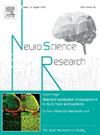Conversion of silent synapses to AMPA receptor-mediated functional synapses in human cortical organoids
IF 2.4
4区 医学
Q3 NEUROSCIENCES
引用次数: 0
Abstract
Despite the crucial role of synaptic connections and neural activity in the development and organization of cortical circuits, the mechanisms underlying the formation of functional synaptic connections in the developing human cerebral cortex remain unclear. We investigated the development of α-amino-3-hydroxy-5-methyl-4-isoxazolepropionic acid receptor (AMPAR)-mediated synaptic transmission using human cortical organoids (hCOs) derived from induced pluripotent stem cells. Two-photon Ca2⁺ imaging revealed an increase in the frequency and amplitude of spontaneous activity in hCOs on day 80 compared to day 50. Additionally, spontaneous neural activity in late-stage hCOs, but not in early-stage hCOs, was blocked by N-methyl-D-aspartate receptor (NMDAR) and AMPAR antagonists. However, transsynaptic circuit tracing with G-deleted rabies viral vectors indicated a similar number of synaptic connections in early- and late-stage hCOs. Notably, chemical labeling demonstrated a significant increase in AMPAR expression on the postsynaptic membrane and colocalization with NMDARs in late-stage hCOs. These results suggest that hCOs progressively organize excitatory synaptic transmission, concurrent with the transition from silent synapses lacking AMPARs to functional synapses containing NMDARs and AMPARs. This in vitro model of human cortical circuits derived from induced pluripotent stem cells reflects the developmental programs underlying physiological transitions, providing valuable insights into human corticogenesis and neurodevelopmental disorders.
人皮质类器官中沉默突触向AMPA受体介导的功能性突触的转化。
尽管突触连接和神经活动在皮层回路的发育和组织中起着至关重要的作用,但在发育中的人类大脑皮层中形成功能性突触连接的机制尚不清楚。我们利用诱导多能干细胞衍生的人皮质类器官(hCOs)研究了α-氨基-3-羟基-5-甲基-4-异恶唑油酸受体(AMPAR)介导的突触传递。双光子Ca2 +成像显示,与第50天相比,hCOs在第80天的自发活动频率和幅度增加。此外,n -甲基- d -天冬氨酸受体(NMDAR)和AMPAR拮抗剂可以阻断晚期hCOs的自发神经活动,而早期hCOs则没有。然而,用g缺失的狂犬病病毒载体追踪跨突触电路显示,早期和晚期hCOs的突触连接数量相似。值得注意的是,化学标记表明,在晚期hCOs中,AMPAR在突触后膜上的表达和与NMDARs的共定位显著增加。这些结果表明,hCOs逐渐组织兴奋性突触传递,同时从缺乏AMPARs的沉默突触过渡到含有NMDARs和AMPARs的功能突触。这个由诱导多能干细胞衍生的人类皮质回路体外模型反映了生理转变背后的发育程序,为人类皮质发生和神经发育障碍提供了有价值的见解。
本文章由计算机程序翻译,如有差异,请以英文原文为准。
求助全文
约1分钟内获得全文
求助全文
来源期刊

Neuroscience Research
医学-神经科学
CiteScore
5.60
自引率
3.40%
发文量
136
审稿时长
28 days
期刊介绍:
The international journal publishing original full-length research articles, short communications, technical notes, and reviews on all aspects of neuroscience
Neuroscience Research is an international journal for high quality articles in all branches of neuroscience, from the molecular to the behavioral levels. The journal is published in collaboration with the Japan Neuroscience Society and is open to all contributors in the world.
 求助内容:
求助内容: 应助结果提醒方式:
应助结果提醒方式:


